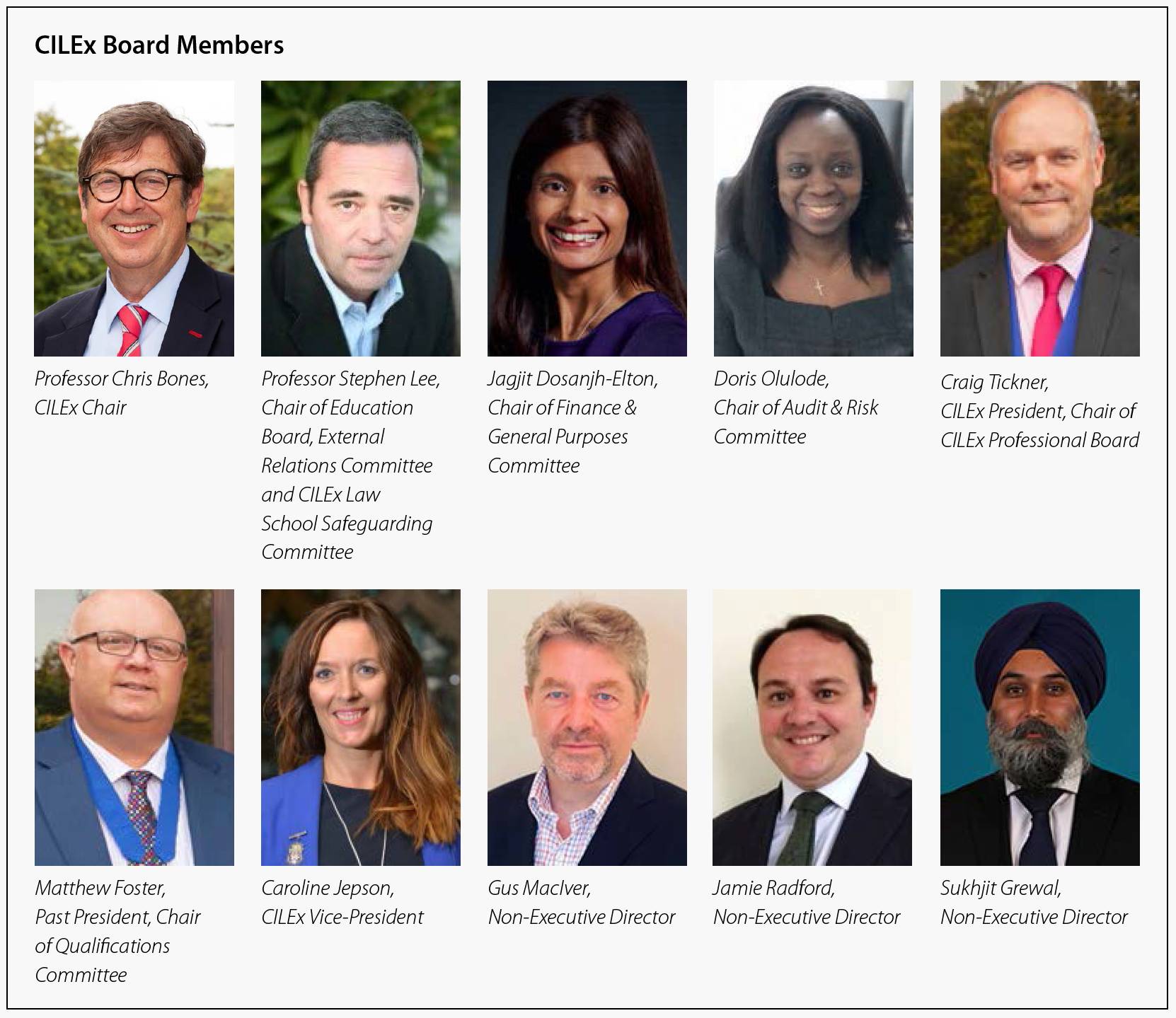CILEx
Message from the CILEx Board:
reinventing the CILEx Lawyer
Professor Christopher Bones summaries CILEx’s latest strategic and operational activities and discusses the Chartered Institute’s ambitions for its members.
 About the author: Professor Christopher Bones is Chair of CILEx Board.When the Board took over formally from the Council on 1 July 2018 we were struck by both the scale of the opportunity for CILEx and its members, but also by the degree to which the organisation we inherited was struggling to deliver to member expectations. The disconnect was significant just about everywhere we looked, and much of the first year was spent putting together a senior team who could take on the challenge of creating a strategy as well as establishing management controls and reporting to assure ourselves that the organisation was being managed in the interests of its members. Our goal was a single organisation servicing the member journey seamlessly from end-to-end in such a way that it delivered an outstanding experience.
About the author: Professor Christopher Bones is Chair of CILEx Board.When the Board took over formally from the Council on 1 July 2018 we were struck by both the scale of the opportunity for CILEx and its members, but also by the degree to which the organisation we inherited was struggling to deliver to member expectations. The disconnect was significant just about everywhere we looked, and much of the first year was spent putting together a senior team who could take on the challenge of creating a strategy as well as establishing management controls and reporting to assure ourselves that the organisation was being managed in the interests of its members. Our goal was a single organisation servicing the member journey seamlessly from end-to-end in such a way that it delivered an outstanding experience.
Working for our members
The last financial year has seen real progress, not just in strategy and control but also as a result, in driving real progress against long-held member ambitions.
Our mantra is simple: effective membership organisations work for their members. Without the right fundamentals (technology, capabilities and proper management controls) we were ineffective and progress was impossible. Once we had gone a long way to getting these things right, we could move forward and over the last 15 months a great deal has been done to address key member issues.
Frustratingly, much of the work done by our staff and our non-executives on your behalf still does not get the wide circulation and acknowledgement it deserves. I am clear: if you do not know what we are doing, that is down to us. We, as a Board, take this very seriously and as a result at our request much work has gone into a wholesale rethinking of how we improve our performance. Craig Tickner is talking about planned changes going forward elsewhere in this edition of the Journal, so do read what he has to say and get involved (see pages 17–19 of this issue).
Advocating on your behalf
This column is, therefore, unapologetically aimed at ensuring you know the scale of the activity that has been launched over the past 18 months to address the three major member issues:
- The continuing existence of practice barriers to genuine equivalence.
- The need to modernise and transform our professional qualification.
- The need to be recognised as lawyers of equal standing.
Practice barriers
There is no a silver bullet to get the remaining barriers addressed, partly because many of them cannot be solved by changes to the law, and partly because - even if they can - the process of change is tortuous and fraught; with the potential for ambush from vested interests.
As Chair, however, I have chosen to take this issue forward and act as the lead proponent for change to government, regulators, other professional bodies and key stakeholders. I have a significant advantage over the President and VicePresident in this regard as no one can accuse me of asking for change in my own self-interest. This has enabled us to change the conversation and avoid charges of ‘special pleading’.
We have, for this year, chosen to focus on three areas where we believe there is significant support for change: Powers of Attorney; access to lender panels; and the inequity created by the use of the Conveyancing Quality Scheme (CQS) to exclude CILEx Lawyers from conveyancing business and the legislative anomalies which fail to recognise the competence of our members.
First and foremost, in each of these cases, there is a very strong argument in the public interest for change. Not least in the cases of Powers of Attorney and the General Qualification, which has been reinforced hugely by the current COVID-19 situation. Starting with this argument has won us friends, allies and most important of all, a recognition in government that the changes we want are in the public interest.
Secondly, underpinning all three of these issues is the uncomfortable truth that needs to be faced by government, lenders and the wider justice system: by dint of their failure to make the changes we want, they continue to discriminate against lawyers from a wide range of social backgrounds, women lawyers and lawyers from BAME communities. Using this argument has found senior leaders very willing to meet us and listen carefully to our concerns and proposals.
We are making progress:
- Having engaged Nationwide Building Society, they are now working on plans that will result in firms regulated by CILEx Regulation Limited (CRL) being able to apply to their lender panel; we now have CILEx Conveyancers in discussions with Nationwide to support this work.
- We are working with HM Land Registry to try and streamline their thinking on reserved matters; we believe our pressure contributed to the change in their rules regarding Powers of Attorney during the COVID-19 period.
- We have a clear acceptance from government that the legislation on Powers of Attorney should be changed. To date, we have no commitment to action. As a result, we are in the process of triggering the first-ever review process enabled by the Legal Services Act 2007 that will, if successful, result in the Legal Services Board (LSB) tabling a formal request for legislative change to the Lord Chancellor.
- We are in conversations with the Crown Prosecution Service about CILEx Lawyers as public prosecutors and the need to remove the barrier of the General Qualification, which prevents their eligibility for appointment as Crown Prosecutors.
- We are actively asking for meetings with the opposition parties in parliament to press our case for change and gain their support.
CILEx Professional Qualification
The CILEx Professional Qualification is coming and it will not only revolutionise the qualification route for CILEx Lawyers, but it will also provide a powerful competitive position against what, increasingly, looks like a Solicitors Qualifying Examination that will continue the elitist 19th century model of university only access. See pages 7 and 8 and pages 9-11 of this issue.
